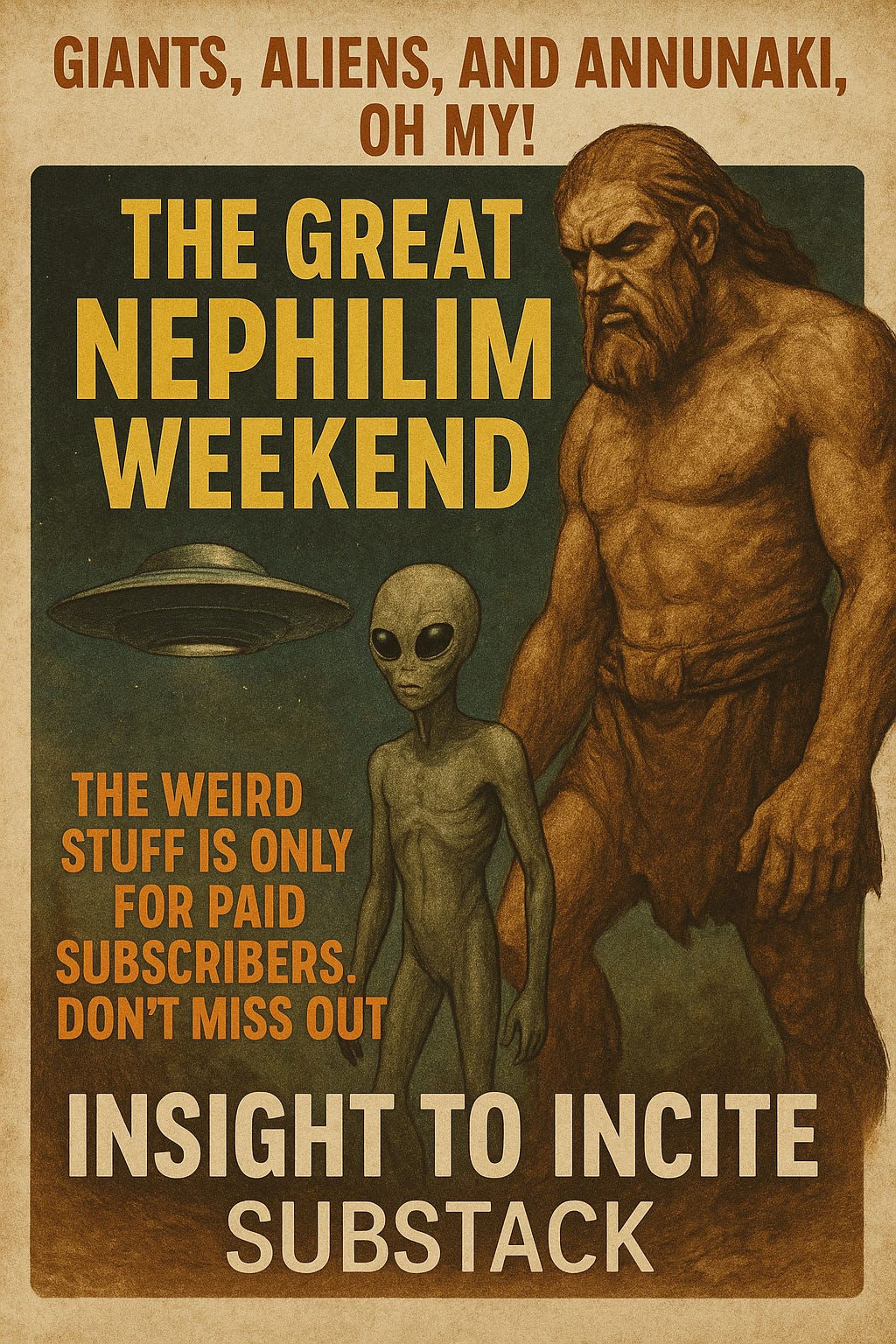There was a time—ten years ago, say—when the thought of writing an even remotely favorable reflection on anything associated with a new movement would’ve prompted a wry smirk and a sarcastic quip from me. I was too busy manning the theological barricades, too committed to the task of naming names and tearing down doctrinal strongholds to entertain the idea that something new might be worth watching—let alone encouraging.
But time clarifies. And history, when written in blood and conviction, has a way of calling its old watchmen back to the wall.
For those unfamiliar with the role I’ve played in what is now a previous generation of evangelicalism, I am JD Hall, Polemics Santa, the infamous discernment blogger, the firebrand polemicist, the name you couldn’t speak in polite Reformed company without invoking eye-rolls or whispered warnings. I was the one who didn’t just engage in discernment ministry—I rebranded it. I repackaged the enterprise under the banner of “polemics,” treating it not as the red-headed stepchild of theology but as a vital discipline alongside apologetics and hermeneutics. Some called it gossip. Some called it tabloid sensationalism. It was warfighting. It was blood work.
And it always - and I mean always - included a thorough Scriptural analysis of the problem, and doctrinal explanation for what went wrong. Many of you are familiar with Protestia’s X account, which highlights clips of Christians doing crazy things, like an evangelical Libs of TikTok. But Protestia’s website and Pulpit & Pen was never that; it always got into the Biblical nit and gritty about Scripture, why something was right or wrong.
For over a decade, I served the church by cataloging the heresies—major and minor, ancient and modern—that were infecting her bloodstream. I traced the charismatic chaos of Bethel and Hillsong straight back to Montanism. I exposed the scientific theism of BioLogos and Tim Keller as born-again Socinianism. I revealed that Jehovah’s Witnesses, far from being novel, were simply repackaging old-fashioned Arianism. I mapped modern heresies to their ancient roots and gave them names—names that stuck.
Theoerosism: the eroticization of devotion, that pagan-scented romance with God you find in John Piper’s worst moments and in evangelicalism’s sentimental excesses.
Vinism: the so-called “gay Christian” movement, spearheaded by Sam Allberry and others, who wrapped sexual confusion in the language of chastity but normalized it all the same.
I named these things. I defined them. I gave the faithful vocabulary.
And while I was doing that, I called out the untouchables. Russell Moore? I was calling him a leftist and a Democratic plant when the rest of evangelicalism was still trying to figure out what a Manchurian Candidate was. I held the line on Moore for a decade while both the left and the respectable right derided me as a conspiracy theorist. Pyromaniacs bloggers like Frank Turk —Phil Johnson’s crowd—were calling me behind the scenes warning that I’d be publicly denounced if I didn’t stop slandering a “Calvinist.” Apparently, Reformed soteriology now bought lifetime immunity from scrutiny. Tom Buck, in those days still wearing his Big Eva training wheels, called for my ordination papers because I dared to criticize Karen Swallow Prior—whom, we were assured, was as conservative as they come.
I called out the Christian Eunuch Movement, long before that phrase had ever been uttered online. Rachel McLaughlin, Sam Allberry, —they were the poster children for a softer, more effeminate evangelicalism that sought to domesticate sexual sin rather than mortify it. I warned about “soft complementariansim,” or flaccid complementarianism, back when Beth Moore was still against female pastors (yes, there was a time). I gently warned about Butterfield’s "pronoun hospitality" while men like James White scorned my concerns. And when Butterfield eventually repented and recanted, White stayed silent.
I fought the New Apostolic Reformation when few even knew what it was. I warned against Bethel, Hillsong, and IHOP-KC before their theology reached into your local youth group. I battled Michael Brown at every turn—pushing back against the fig leaf of credibility he borrowed from his friendship with James White. While they used their relationship to soften concerns among Reformed circles, I was there swinging the blade. Alone, most days.
I named Clayton Jennings a sexual predator years before the testimonies started surfacing—before the Plan B pills, before the tears and trauma of young women seduced and discarded. I exposed others and then, myself. Because polemics, when wielded rightly, makes no room for self-delusion.
But more than names, I made my mark as a judge of movements. My readers—more than a million each month—looked to me for a verdict: thumbs up or thumbs down, Nero-style. Should they attack? Should they refrain? I was the original Megan Basham before Basham had her receipts. I tracked the dark money: George Soros, James Riady, the Kern Family Foundation. I followed the money trails that bought influence in the SBC and turned seminaries into think tanks for progressive theology. I regret giving a thumbs-up to James Lindsay as a favor to O’Fallon, when he was first trotted out as an expert on Cultural Marxism, being assured his only contribution to evangelicals would be as an expert witness on the Frankfurt School. I regret now staying the hand of the discernment community, but that was one of very few mistakes of judgment. The point is, the direction my thumb was pointed mattered to a good many people (to the chagrin of good many more).
I went after the big dogs—Mohler, Dever, Duncan—long before it was fashionable to do so. I called them the emperors of evangelical social justice while MacArthur’s camp felt they couldn’t afford to burn bridges. Not because they disagreed with me, but because I was naming names they still had to share conference stages with. I paid for it.
My point is this: for over a decade, I was evangelicalism’s bloodhound—sniffing out heresy before anyone else knew where to look. I pointed like a bird dog at false doctrine that most couldn’t yet see. I usually saw it first. I said it loudest.
The next movement is stirring. And as before, people are watching me. Waiting. Wondering: what will Hall say?
As I stepped away from the frontlines of polemics to plant my fields and build my fences—literally and spiritually—I stayed largely silent. For two years, I laid low, consulted only with a few trusted men, and tried to sort out what remained of the public evangelical square after years of war. Most of the voices I stayed in touch with were at the very tip of the spear of the anti-Christian Nationalist movement—men who had not only drawn a line in the sand, but armed it with sandbags and artillery.
These men, assuming I would eventually return to the fray, tried their best to inoculate me against the Christian Nationalist (XNat) movement. They warned me of its flaws, its extremes, its dangers. They salted the ground of my imagination with all the worst-case scenarios. And perhaps they had good reason to. The movement did, after all, seem to sprout like saplings in the scorched soil I left behind—as if the moment my back was turned, something wild and organic sprang up in the open space.
One of them told me, flat out: "You can’t push this movement, but you could kill it." That was high praise. Not entirely accurate, I think—but flattering nonetheless. And certainly not untrue that a concentrated, coordinated critique from the discernment community could deal the movement a substantial blow, especially when joined to the already-unrelenting opposition from mainstream evangelical influencers. If I chose to pile on, it could prove to be the straw that breaks the camel’s back.
But here’s the thing: I won’t. Because I see something more in the Christian Nationalist movement than its critics allow. I see strength. I see conviction. I see—dare I say it—a move of God. And I know what it’s like to have the evangelical machine turned against you. I know what it’s like to be betrayed by the very mentors who once taught you to stand tall.
So if you've been paying attention, you’ll note I’ve never joined the chorus of those labeling Christian Nationalism a threat to the gospel. I’ve never issued wholesale condemnation. But I also haven’t endorsed it. I haven’t called myself a Christian Nationalist. And that’s not because of optics. It’s because of conviction.
NOT A CHRISTIAN NATIONALIST
My hesitation is not rooted in tone or style or temperament. It’s doctrinal. It is confessional. And I draw that line with full awareness of the cost.
I still affirm, without apology or revision, the Second London Baptist Confession of Faith, in harmony with the 1788 American revision of the Westminster Confession. That revision—rarely discussed, and even more rarely understood—removed from the WCF the language that empowered the civil magistrate to enforce the First Table of God’s Law.
That revision was right. And I’ve stood by it since the Great Theonomy Debate of 2014. I do not believe that the state has the God-given jurisdiction to legislate the First Table—that is, the commands pertaining to man's duty to God: worship, Sabbath, idolatry, and blasphemy. The magistrate’s God-ordained authority lies within the Second Table—those commands pertaining to man’s duty to fellow man.
This conviction stems not only from confession, but from Christ Himself. In Matthew 22:21, Jesus told the Pharisees, “Render to Caesar the things that are Caesar’s; and to God the things that are God’s.” Caesar is owed taxes and civic allegiance. God is owed worship and reverence. The state must police theft and murder; it must not regulate worship.
This is the central issue. This is the line. And sadly, in all the debates over Christian Nationalism, this point has been largely ignored. People are too busy fighting over personalities—over Doug Wilson’s antics or Stephen Wolfe’s phrasing—to even touch the confessional heart of the matter.
Men who should know better—men like James White—have not led us through this debate with maturity or clarity. Instead of modeling how Reformed men ought to contend over serious issues, they’ve resorted to the theater of internet takedowns. Wilson, for all his gifts, has not been a model of restraint or clarity either. The debate has not been edifying. It has been destructive.
The real question that remains unasked is this: Was the 1788 revision a mistake? That’s where the fault line lies. That’s the theological battleground. Everything else is smoke.

WHERE THE CHRISTIAN NATIONALISTS ARE RIGHT
But while I remain on the outside of the XNat label due to confessional conviction, I would be a liar—and an ungrateful one—if I didn’t acknowledge where the movement has been a clarifying and much-needed force for truth.
Let’s start with “blood and soil.” To some, that phrase is an immediate disqualifier, echoing with 20th-century connotations. But the Christian Nationalists are right to rehabilitate and reclaim it, because it’s biblical.
In Genesis 10, we are given the Table of Nations: “These are the sons of Shem, after their families, after their tongues, in their lands, after their nations.” In Hebrew, the crucial phrase is:
לִלְשֹׁנֹתָ֑ם בְּאַרְצֹתָ֖ם לְגוֹיֵהֶֽם׃
"According to their languages, in their lands, by their nations."
What God ordained here is something far richer—and more grounded—than mere ideology. He established peoples with shared language, lineage, and land. That’s not white nationalism. That’s not racism. That’s Scripture.
The Christian Nationalists are correct when they assert that America is more than an idea. Ideas don’t make nations. Blood and soil do. A man doesn’t die for an abstraction—he dies for a people, a place, a lineage. The Post-War Consensus sought to redefine nationhood as a mere collection of values—conveniently untethered from history, kinship, or territory. That’s not biblical. It’s globalist propaganda. And the XNats are right to reject it.
Now, let me be clear: there are those who take “blood and soil” too far. They cross a line—suggesting that some races are inherently less valuable in the sight of God. That’s not biblical. That’s wicked. It must be rebuked. But the presence of fringe elements within a movement doesn’t indict the movement as a whole.
As a Baptist, I know this all too well. Fred Phelps was a Baptist. Does that make me a Westboro cultist? Hardly. To judge all Baptists by their worst representatives would be lazy, dishonest, and unjust. The same standard must apply to XNats. A few racists in the tent don’t make the entire gathering corrupt.
We must apply the Golden Rule to our polemics: judge others with the same charity you’d hope to receive. If you don’t want to be defined by your worst fringe, don’t define others by theirs.
THEY’RE ASKING THE RIGHT QUESTIONS
Beyond blood and soil, the Christian Nationalist movement deserves credit for challenging the Post-War Consensus that has held evangelicalism captive for nearly a century. While most evangelicals are content to bemoan the symptoms of decay—drag queen story hours, the sexual revolution, fatherless homes—the XNats have taken a jackhammer to the foundation.
They’re asking the tough questions: Why has the West collapsed? Why is the church culturally irrelevant? Why have we surrendered our institutions, our language, our history?
They’re not content with lamentation. They want diagnosis. They want reconstruction. And in doing so, they’ve revealed the cowardice of the evangelical mainstream. Big Eva will tweet about cultural decay, but it won’t trace the rot to the source. It won’t name the idols. It won’t overturn the sacred cows.
The Christian Nationalists will. And for that, they deserve respect.
GRACE IN DISAGREEMENT
In the end, my disagreement with the Christian Nationalist project—confessionally rooted though it is—is no greater than my old disputes with the Theonomists of yesteryear. And we still called one another brothers.
My disagreement is smaller than my disagreement with Presbyterians on infant baptism. It’s a much smaller matter than my ongoing issues with Doug Wilson on Federal Vision—a theological hydra that, last I checked, still hadn’t been slain.
So yes, I disagree. But I also respect. I critique, but I won’t condemn. And I pray God continues to raise up men of courage—men who are asking the right questions, even if some of their answers still need refinement.
They are not a danger to the church. They are not wolves. They are not enemies.
They are honorable.
They are good.
And they’re worth watching.
THE XNATS IN PERSON. HAVE YOU EVER BEEEEN?
I've spent my years in the trenches of the Christian conference circuit—ShepCon, G3, Desiring God in Minneapolis, even Driscoll's arena events in Raleigh-Durham. I’ve hosted my own gatherings like Reformation Montana and the Judge Not Conference. I’ve stood behind pulpits beside Paul Washer and Voddie Baucham, and sat among the audience as John Piper mused about whatever deep but also kinda gay thought he had, which at the time, I thought to be terribly profound. I listened to Joel Beeke from the front row, trying to stay awake and failing, and even heard JD Greear lecture about church planting strategies from the cheap seats, after a Reformed Rapper discuss the bling-bling (that’s the word he used) he was gonna get in Heaven, and referred to expositional preaching as “spitting.”
To say I’ve seen the landscape is an understatement. I know its rhythms, its patterns, its pretenses. That’s why I journeyed to Layton, Utah, for New Christendom Press’ "Safety is Third" conference not as a fanboy or flag-bearer, but as an observer. What I encountered wasn’t a mere assembly of like minds. It was a movement in gestation—something visceral, something weighty. And despite my default skepticism, I found myself compelled.
A CONFERENCE THAT DIDN’T FEEL LIKE A BREAK FROM THE WORLD
Most evangelical conferences function as retreats. Attendees disengage from the battles of culture, politics, and family life to seek sanctuary among familiar doctrines and familiar names. There’s nothing inherently wrong with that, but there’s something tired about it—something escapist.
“Safety is Third” didn’t offer an escape. It offered a commission. From the moment I walked in, I sensed that this gathering wasn’t meant to soothe, but to stir. The tone wasn’t sabbatical—it was strategic. It wasn’t a place to lick wounds, but to sharpen blades. Unlike the anesthetized calm of a G3 or ShepCon, the atmosphere in Layton crackled with conviction. These men and women weren’t hoping to survive the world. They were planning to watch Christ conquer it.
UNSELFCONSCIOUS, UNAPOLOGETIC, AND UNBOTHERED
There’s an almost comical level of self-awareness at many big-name evangelical events. Speakers posture. They drop theologically dense references to prove their depth, gesturing toward one another like chess players anticipating applause. The crowd, often more interested in approval than application, nods along in ritualistic affirmation.
Here, there was none of that. The men who took the stage didn’t seem to care who was in the room. Their message wasn’t curated to impress, and their rhetoric lacked the polish of someone aiming for Twitter virality. It was, in a word, earnest. They weren’t trying to sound smart. They were trying to speak truthfully. And that made all the difference.
NO SNIPING, NO STATUS GAMES
Perhaps the most striking absence at “Safety is Third” was the evangelical infighting. There were no subtle barbs at rival ministries, no mean-spirited jabs, no sanctified gossip disguised as discernment. The speakers didn’t appear interested in defining themselves by what they were against, but by what they were for. That’s rare in this world.
It wasn’t apathy. It was clarity. There was no time to play inside baseball when the larger game—the cultural and spiritual crisis of the West—is burning outside the stadium.
A PRESUPPOSITIONAL THEOLOGY, NOT AN EXERCISE IN APPEASEMENT
To the casual observer, Christian Nationalists may appear doctrinally shallow. Their conferences are not typically organized around fine-tuned theological disputes—no panel discussions parsing supralapsarianism or the fine distinctions of infralapsarianism. But to equate that with a lack of seriousness is a grave misreading.
What I witnessed was not disinterest in doctrine, but an assumption of it. For the XNat crowd, orthodoxy is not the destination—it’s the point of departure. They begin with it, and move outward into the practical realms of politics, culture, and dominion. When Joel Webbon invited Calvin Robinson—a high-church Anglican —critics balked (and I didn’t like it). They couldn’t comprehend that it wasn’t a conference on Sola Fide. Aren’t all conferences supposed to espouse on the five points?
The truth is, XNats are not gathering to rehearse the catechism. They’re gathering to wield it.
AN EXPECTANT MOVEMENT WITH A VISION FOR THE FUTURE
The sense of momentum at the conference was impossible to ignore. I’ve seen plenty of crowds content to be taught. This crowd wanted to be deployed. Christian Nationalism, for all its inconsistencies and rhetorical oversteps, is offering something precious: a path forward.
The topics on everyone’s mind weren’t hypothetical. They were human. Housing costs. Food scarcity. National identity. The loneliness of modern men. The death of culture. And the abandonment of tradition by the church. The XNat crowd isn’t sitting around debating footnotes from Bavinck. They’re trying to figure out how to survive—and how to build something beautiful amid the ruins.
Compared to this, mainstream evangelicalism feels like a museum curator lecturing starving men on the history of bread.
A MOMENT OF WORSHIP THAT FELT GENUINE
To my great satisfaction, worship was not absent. It was dignified. Unforced. Sincere. There were no flashy theatrics, no fog machines, no emotional manipulation through perfectly tuned soundboards. Just voices raised, truth proclaimed, God exalted. The simplicity made it feel like something recovered from an older, purer time.
Credit is due to Suave and Conn, the organizers, for creating space for reverence without showmanship. In many Reformed circles, worship has become an afterthought—relegated to obligatory singing between monologues. At “Safety is Third,” it was treated with the reverence it deserves.
THE PEOPLE: STRONG, MODEST, AND UNAPOLOGETICALLY NORMAL
There’s a visual dissonance between this crowd and the average evangelical conference attendee. The people at this gathering were healthy—not just spiritually, but physically. There was a noticeable emphasis on fitness, discipline, and dignity.
The women were modest, maternal, and composed. Nursing mothers sat comfortably among the crowd. Children were present—and welcomed. The men were strong, upright, and largely unimpressed with modernity’s indulgences. There was a visible rejection of the soft decadence that characterizes so much of evangelical culture.
You can scoff at appearances, but cultural health often mirrors physical bearing. These were people who haven’t given up on the idea of Christian civilization—including its embodiment.
THIS WASN’T A CONFERENCE. IT WAS A COUNCIL.
In the final analysis, “Safety is Third” did not feel like a typical theological summit. It felt more like a council of dissidents. A gathering of builders, dreamers, and believers who still think the church on earth can mean something. It didn’t present itself as a spiritual vacation. It presented itself as a preparation for labor.
And for those of us who have grown weary of the performative, political, and preening culture of mainstream evangelicalism, it offered a glimmer of hope—quiet, firm, and full of resolve.
Something is stirring. And it’s worth watching.
If you appreciate my work, please consider an $8 a month or $80 year subscription to access exclusive content.
If you don’t want a subscription, please consider a one-time gift of your choosing by clicking the ‘coffee link’ below. This is one of the things I do to provide for my small farm and big family, so I sure appreciate it.


















Share this post